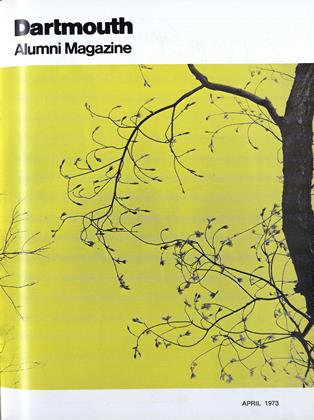By Richard Eberhart'26(Class of 1925 Professor and Professor ofEnglish. Emeritus.,) New York: Oxford UniversityPress, 1972. 64 pp. $5.95.
"The Second Coming" by W.B. Yeats contains a line frequently quoted: "Things fall apart; the centre cannot hold." Eberhart dedicates his first poem to Yeats and asks whether we can make it to the year 1984 slithering so ominously close. If the young, "ventriloquists all," laugh at Yeats's singing Byzantium bird, they are denied the golden bough, which even if granted would be only tinsel. And so the title emerges, for there is no reality except in the spirit: "We are easy riders to the fields of grace,/ a bombshell in the gut."
Conrad Aiken has spoken of Eberhart's Blakean intensity of vision. Eberhart longs for the "land of excess" with its "heightened awareness of truth." All children know joy, and every man of imagination could be like a child, perfectly pure. Negative specialists and scientific absolutists holding the world in check cannot make "a bright leap into the air/ To hold life holy there." Poets with broken wings teach men how to fly. All men could be free, because every man "has a secret heart of pure imagination." The soul has no habitat. If Eberhart were. God, he would "be ashamed of being absolute." In his vision of Heaven and Hell, Eberhart longs to be relative and thus as devil enjoy, guiltless, celestial felicities and as sweetness-and-light angel exert power "to raise Cain and to put down Abel."
Eberhart calls on not only Blake but also Boehme and Beddoes to support him about Kenya tribesmen, the Turkana, naked men with spears seven feet tall, and young girls, barefoot, "sweet Helens of Africa, immortal, tall, stately, and naked. who transport him away from Western surfeit "to some immortal joy."
One of Robert Frost's quick tests for poetry was rhymes, which he often read first in isolation, but Eberhart is little concerned with them. But, like Frost, Eberhart views nature with seriousness lightened by whimsicality. The voiceless tenacity of green shoots by rigorous law can overwhelm the earth, but he mocks a tendril, "I live, you have no imagination." A particularly Frostian gnat on the poet's exploratory paper does not know how absurd it is never to have thought of Plato. Wanting to be ingrown as a contemplative poet, an icicle, "Jehovah at first," under elongation by sunlight realizes that it can be real only for a season, philosophizes that time must destroy him, and, finally, patiently elegant, dissolves. In the New York Public Library where silent readers conjure up Eleanor of Aquitaine and Juliana of Norwich, Eberhart sees only his faun with brilliant amber eyes, "delicate ears ... raised to hear of love, her shanks smooth and sleek." In that Library, only Eberhart possesses sufficient visual acuity to revel in such luminous deliciousness.
He judges his own mind to be elusive, airy light a darting flyer with weights, and he would employ it to persuade him "to evade the flesh." Despite temptation, "birds fly back to grip the tree." Sensuousness is not to be denied, however. When the poet plays the music of Charlie Byrd, "dark rushes of horses over the plains." he sometimes confuses him with Charles Ives, "fret of a flute." "Music is the keys to the stars and the sea," and the aesthetic stimulus, unforgettable, throws the poet "along the decibles of the ages." But philosophic lucubrations will assert themselves. Since childhood, haunted by Oedipus, Lear, and Hamlet, Eberhart now accepts the indifference of the divine order, human loneliness, almost unrelieved suffering, and death, too often ignominious and not often enough ennobling. With his five senses liberated by music, history, poetry, and dreams, he can realize the ineffable sense of something beyond him. "Uncapturable as the grace of a humming bird," it renders him, at the fulfilment of sensuous perception "speechless before life and death." A fog lifts with the inner self, which apocalyptically catches a glimpse of eternity and "... in wordless immanence/ Goatfooted gods splashing light."
 View Full Issue
View Full Issue
More From This Issue
-
 Feature
FeatureMedical Care via Television
April 1973 By BLISS KIRBY THORNE '38 -
 Feature
FeatureGuatemalan Cane Raiser
April 1973 By M.B.R. -
 Feature
FeatureArt Carpenter
April 1973 -
 Feature
FeatureHanover Has A Mardi Gras
April 1973 -
 Article
ArticleFaculty
April 1973 By ROBERT B. GRAHAM '40 -
 Article
ArticleThe Undergraduate Chair
April 1973 By DREW NEWMAN '74
JOHN HURD '21
-
 Article
ArticleHanover's First Aid Maestro
December 1942 By JOHN HURD '21 -
 Article
ArticleThis Mother of Seven Dartmouth Sons Read Every Book in the College Library
DECEMBER 1965 By JOHN HURD '21 -
 Books
BooksTHE NIGHT BOAT.
MAY 1969 By JOHN HURD '21 -
 Books
BooksBLUFF YOUR WAY IN THE CINEMA.
OCTOBER 1969 By JOHN HURD '21 -
 Books
BooksFurther Mention
JANUARY 1972 By JOHN HURD '21 -
 Books
BooksFRANCE-NORD. VOLUME I. ARTOIS. ESTRÉE-BLANCHE. LA REGION D'AIRE ET AU-DELA. HISTOIRE. HABITANTS. HISTOIRES.
MAY 1972 By JOHN HURD '21
Books
-
 Books
BooksALUMNI PUBLICATIONS
February, 1924 -
 Books
BooksTouraine and Champaigne
August 1945 -
 Books
BooksTHE DARTMOUTH SCENE
January 1950 By Charles A. Proctor '00 -
 Books
BooksORNAMENTAL INITIALS: THE WOODCUT INITIALS OF CHRISTOPHER PLANTIN.
January 1975 By RAY NASH -
 Books
BooksPOLITICS AND PUBLIC SERVICE:
June 1939 By W. L. Eager '23 -
 Books
BooksMorning Sunsets
APRIL 1932 By Wallace Rusterholtz

